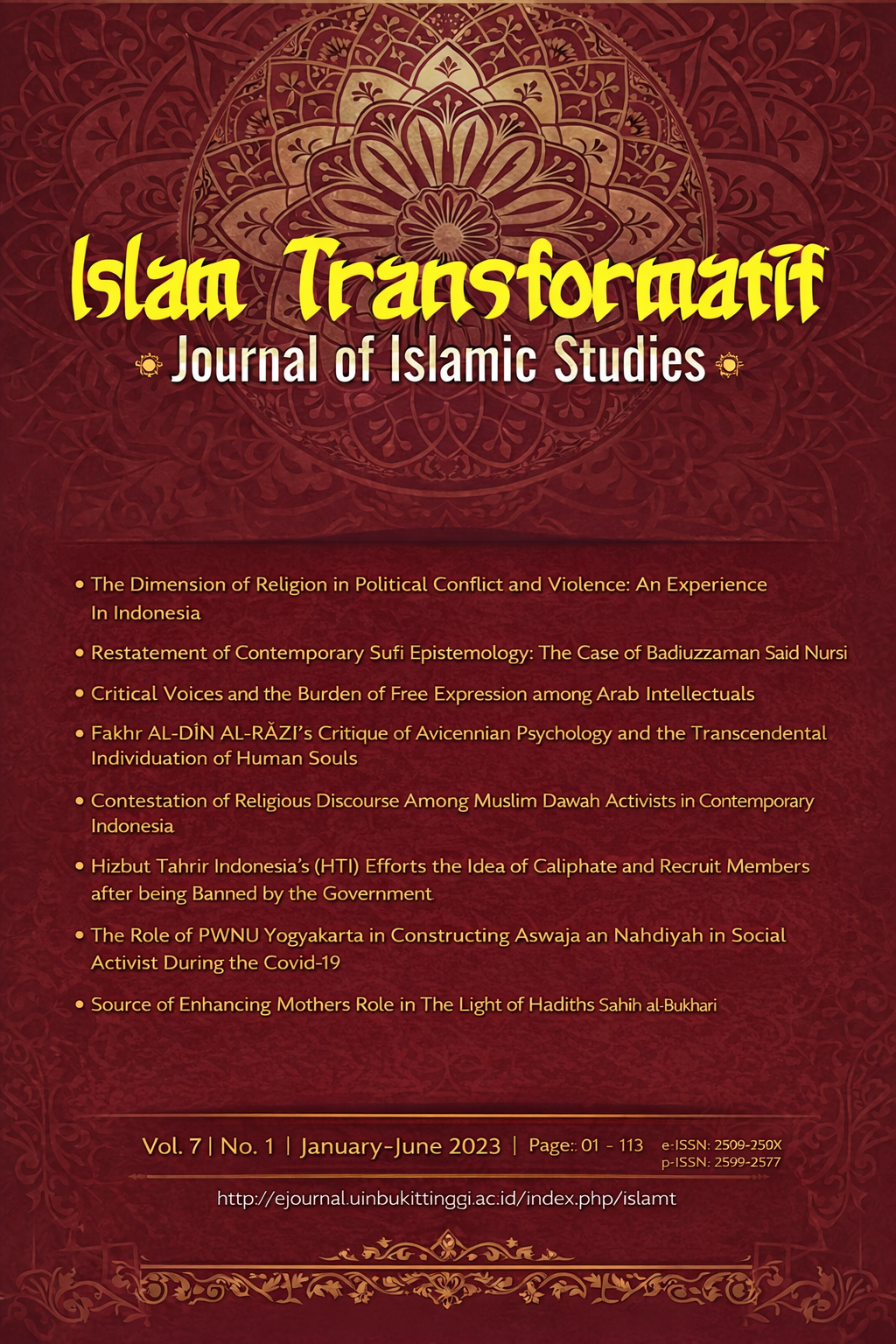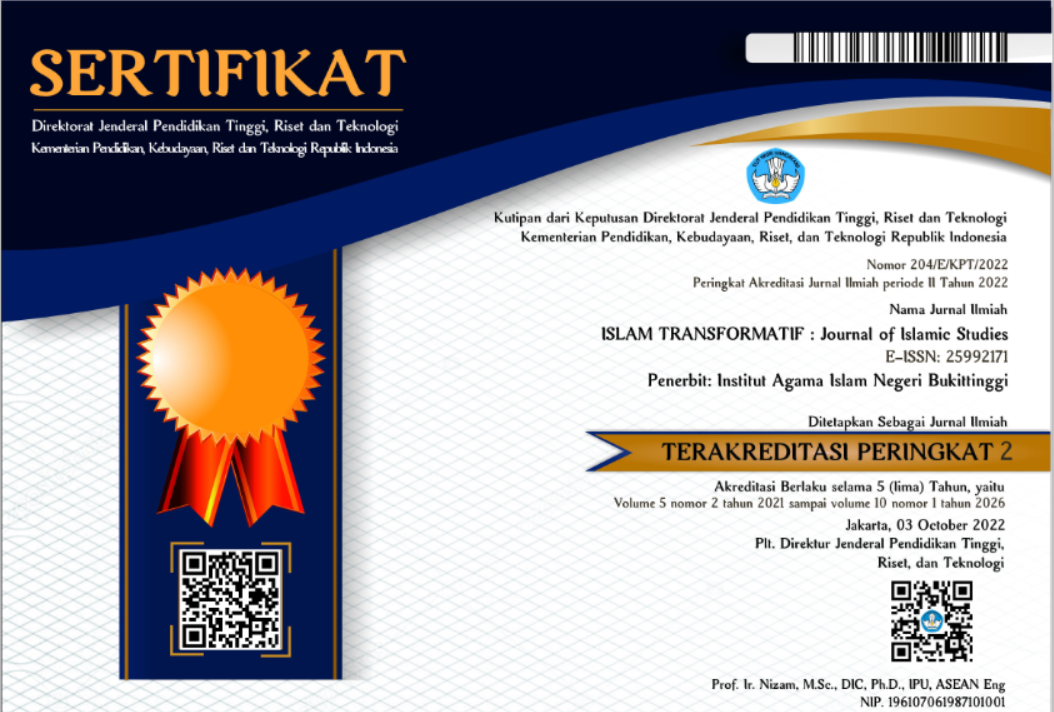Restatement of Contemporary Sufi Epistemology: The Case of Badiuzzaman Said Nursi
DOI:
https://doi.org/10.30983/it.v7i1.6167Keywords:
Sufism, Epistemology, Contemporary, ModernismAbstract
This study aims to explore the epistemological construct of Sufism according to Said Nursi in the contemporary era. Sufism is seen as having deviant concepts and practices contrary to Sharia in the modern era. Some muslim and non-muslim thinkers argue that Sufism does not originate from Islam. Therefore, there needs to be an effort to decipher this misunderstanding by exposing how Sufism's epistemology was genuinely constructed by referring to the teachings and practices of a contemporary Sufi, Sa'id Nursi. This study is qualitative library research. Data in this study, both primary and secondary, were collected using documentary techniques. The collected data were analyzed utilizing the content analysis method. This work finds that Nursi outlines four pillars of Sufism epistemology. First, true Sufism is based on the Qur'an and Sunnah, internalized and manifested through the soul and heart, as is the view of the authoritative Sufis. Second, purification of the teachings and practices of Sufism must depart from the purgation of the heart and soul. Third, social equality refers to carrying out lifes values, meaning that all are equal before Allah SWT. Fourth, consistently instill the Qurans four values: tauhid (unity and oneness of God), nubuwah (prophecy), hashr (resurrection), and 'adl (justice).
References
Abdullah, Taufik, and Dkk. Ensiklopedi Tematis Dunia Islam: Pemikiran dan Peradaban. Vol. 4. Jakarta: Ichtiar Baru Van Hoeve, 2002.
Amin, Syamsul Munir. Akhlak Tasawuf: Ilmu Tasawuf. Jakarta: Taruna Grafika, 2012.
Amin Syukur, M. Menggugat Tasauf : Sufisme dan Tanggung Jawab Sosial Abad 21. Yogyakarta: Pustaka Pelajar, 2002.
Auliahadi, Arki, and Ariska Oktavia. “Perkembangan Awal Islam di Nusantara dan Wacana Sufistik Tasawuf Falsafi Pada Abad 17.†Islam Transformatif : Journal of Islamic Studies 03, no. 01 (2019): 1–9. https://doi.org/10.30983/it.v3i1.857.
Bagir, Haidar. Buku Saku Tasawuf. 2nd ed. Bandung: Mizan Pustaka, 2006.
Bahwan. “Konstruksi Sosial dalam Tradisi Keagamaan (Analisis Tentang Praktik Ziarah Makam Keramat di Lombok).†UIN Syarif Hidayatullah, 2019.
Chittick, William C. The Sufi Path of Knowledge: Ibn Al-‘Arabi’s Metaphysics of Imagination. Pakistan: Suhail Academy Lahore, 2000.
Dahlan, Abdul Aziz. “Tasawuf Sunni dan Tasawuf Falsafi : Tinjauan Filosofis.†Ulumul Qur’an: Jurnal Ilmu dan Kebudayaan II, no. 8 (1991).
Faiz, Muhammad. “Konsep Tasawuf Said Nursi: Satu Penyegaran Wacana Sufisme Kontemporer.†Al-Zehra. Dershane Mesir, 2015.
Hariyanto, Selamet. “Epistemologi Tasawuf Modern (Telaah Atas Buku Tasawuf Modern Karya Hamka).†IAIN Surakarta, 2017.
Ihsan, Nur Hadi, Wan Mohd Azam Mohd Amin, Jarman Arroisi, and Moh. Isom Mudin. “Sufi Epistemology: ‎ Being the Earliest Exposition in Kitâb Al-Luma’ of Al-Sarrâj and ‎its Manifestation in the Works of Indonesian Sufis.†Tsaqafah 17, no. 2 (2022): 275–302. https://doi.org/10.21111/tsaqafah.v17i2.7104.
Ihsan, Nur Hadi, Che Zarrina Binti Sa’ari, and Muhammad Sofian Hidayat. “Abdurrauf Al-Singkili’s Concept of Insan Kamil in Facing The Crisis of Modern Human Morality.†Islam Realitas: Journal of Islamic and Social Studies 8, no. 1 (July 13, 2022): 22–35. https://doi.org/10.30983/islam_realitas.v8i1.5487.
Muhammad Azhar dan Hamim Ilyas (ed). “Pengembangan Pemikiran Keislaman Muhammadiyah: Purifikasi dan Dinamisasi.†Yogyakarta: PP. Majelis Tarjih dan PPI & LPPI U MY, 2000.
Ni’am, Syamsuddin. Tasawuf Studies: Pengantar Belajar Tasawuf. Edited by Rose KR. Yogyakarta: Ar-Ruzz Media, 2014.
Nursi, Bediuzzaman Said. Al-Kalimat. Translated by Ihsan Kasim Salihi. 6th ed. Cairo: Sozler Publications, 2011.
———. Al-Lama’at. Translated by Ihsan Kasim Salihi. 6th ed. Cairo: Sozler Publications, 2011.
———. Al-Maktubat. Translated by Ihsan Kasim Salihi. Cairo: Sozler Publications, 2011.
———. Anwar Al-Haqiqah: Mabahits Fi Al-Tasawuf Wa Al-Suluk. Translated by Ihsan Kasim Salihi. Cairo: Syarikat Sozler, 2002.
———. Letters. Edited by Osman Birgeoglu and Risale-i Nur Institute. Translated by Sukran Vahide. Istanbul: Sozler Nesriyat, 2010.
———. Siratu Dzatiyah. Translated by Ihsan Kasim Salihi. Istanbul: Sozler Nesriyat, 1998.
Riyadi, Abdul Kadir. “Jalan Baru Tasawuf: Kajian Tentang Gagasan Abu Bakr Al-Kalabazi.†Tsaqafah 11, no. 1 (2015): 29–50. https://doi.org/10.21111/tsaqafah.v11i1.252.
Sakdullah, Muhammad. “Tasawuf di Era Modernitas (Kajian Komperhensif Seputar Neo-Sufisme).†Living Islam: Journal of Islamic Discourses 3, no. 2 (2020). https://doi.org/10.14421/lijid.v3i2.2504.
Shodiq, Ja’far. Pertemuan Thareqat dan NU. Yogyakarta: Pustaka Pelajar, 2008.
Sholihin, Muhammad. Sejarah dan Pemkiran Tasawuf di Indonesia. Bandung: Pustaka Setia, 2001.
Suprayogo, Imam, and Tobroni. Metodologi Penelitian Sosial Agama. Edited by Miftah F Rahmat. Bandung: Remaja Rosdakarya, 2003.
Taimiyyah, Ibn. Fiqh Al-Tasawuf li Syaikh Al- Islam Al-Imam Ibn Taimiyyah. Edited by Zahir Syafiq Al-Kabby. Beirut: Dar al-Fikr al-’Araby, 1993.
Thoriquddin, Muhammad. Sekularitas Tasawuf: Membumikan Tasawuf dalam Dunia Modern. Malang: UIN Malang Press, 2008.
Vahide, Sukran. The Author of the Risale-i Nur Collection Bediuzzaman Said Nursi. Istanbul: Sozler Publications, 1992.
Yulanda, Atika, and Ario Putra. “Tasawuf Junaid Al-Baghdadi dan Implikasinya di Era Kontemporer.†Manthiq 5, no. 2 (2020): 74–85.
Downloads
Published
How to Cite
Issue
Section
Citation Check
License
Copyright (c) 2023 Agisni rodi, Nur Hadi Ihsan, Muhammad Sofian Hidayat

This work is licensed under a Creative Commons Attribution-ShareAlike 4.0 International License.
Authors who publish with this journal agree to the following terms:
- Authors retain copyright and grant the journal right of first publication with the work simultaneously licensed under a Creative Commons Attribution-ShareAlike 4.0 International License that allows others to share the work with an acknowledgment of the work's authorship and initial publication in this journal.
- Authors are able to enter into separate, additional contractual arrangements for the non-exclusive distribution of the journal's published version of the work (e.g., post it to an institutional repository or publish it in a book), with an acknowledgment of its initial publication in this journal.
- Authors are permitted and encouraged to post their work online (e.g., in institutional repositories or on their website) prior to and during the submission process, as it can lead to productive exchanges, as well as earlier and greater citation of published work (See The Effect of Open Access).




